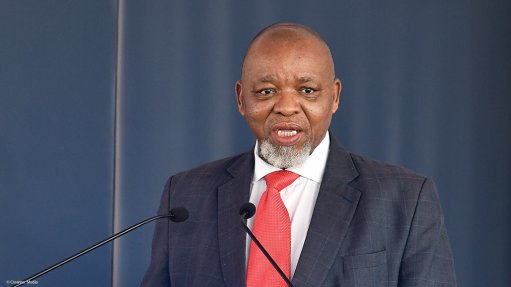
Gwede Mantashe's announcement of a R400-million fund to support new mining exploration is not enough to resolve the underlying issues facing the mining sector, says Old Mutual
Photo by: Creamer Media
It is policy uncertainty that is deterring investors from investing in the country’s mining sector and structural reform is needed to allow the sector to regain competitiveness, Old Mutual Investment Group resources analyst Ian Woodley emphasises.
He warns that South Africa lacks both a secure investment environment and the attractive fiscal regime necessary to attract investment into the sector.
He points out that, for more than a century, the mining sector has been an essential component of South Africa's economy, contributing about 7.5% to gross domestic product and accounting for about 60% of the country’s exports by value.
However, over the past year, the mining sector saw profits decline by nearly R100-billion owing to the challenging operating environment, as well as lower commodity prices, Woodley asserts.
He points out that, last week, large mining companies including Impala Platinum, Northam Platinum, Anglo American Platinum and Sibanye-Stillwater all experienced considerable declines, with losses ranging from 3.57% to 7.72%, following a spotlight on the sector generated by the yearly Investing in African Mining Indaba.
During the Mining Indaba, Mineral Resources and Energy Minister Gwede Mantashe announced a R400-million fund to support new mining exploration. Woodley says that while this is a positive step, it is not enough to resolve the underlying issues.
“The fund starts to address the fiscal aspect but, without the comprehensive and welcoming legislation that investors demand for long-term commitment, this is unlikely to yield many positive results,” he says.
According to the Fraser Institute's Investment Attractiveness Index, South Africa ranks among the least attractive jurisdictions in the world, placing it in the bottom ten. This highlights the need for immediate attention to the country’s regulatory framework to restore investor confidence in the mining sector, Woodley emphasises.
While the global drive towards decarbonisation is minerals intensive, the South African domestic equities have limited to no exposure to some of the battery metals that are considered to be the main beneficiaries of this trend (with the exception of Sibanye), says Woodley.
This leaves South African investors having to focus primarily on the large mining players, such as Anglo American, BHP and Glencore for exposure to the energy transition, he adds.
“However, the overreliance on these established mining giants poses challenges for sectoral expansion and may stifle growth of the smaller players, and this cannot be a good outcome for the sector, or the country,” warns Woodley.
“For the sector to regain its vigour and to remain an important part of the South African economy for years to come there is a need for swift fundamental sectoral transformation, and we can only hope that there are productive discussions between the government and the sector to formulate a plan that will enhance the attractiveness of the country's mining sector. Without this, South Africa risks degrading a historically significant employer,” he adds.